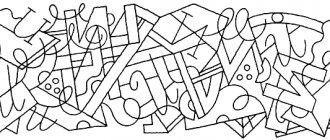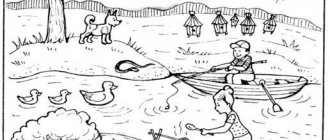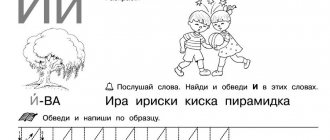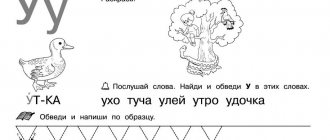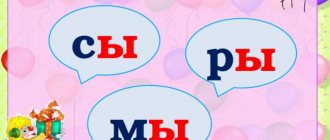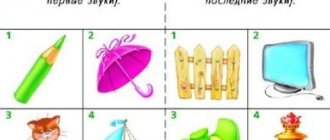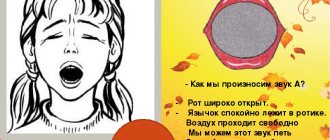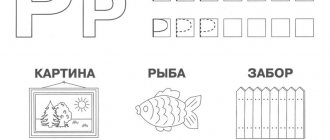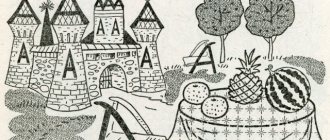Task for preschoolers: printed letter E
It is difficult for young children to perceive information only by ear, so it is better to do exercises that also involve eye contact with objects.
Exercise 1
Write E and E in three different colors, for example red, blue, green.
Task 2
Give examples of 3 animals whose names begin with E. Suitable words: raccoon, echidna, unicorn.
Task 3
Name three words starting with E. For example, Christmas tree, ruff, hedgehog.
In one of the tasks, the child must say a word starting with Yo, for example Hedgehog.
Task 4
Circle all the E and E in the presented row: A c g v E l e v Sh f m i E y c e f X S F sh k e e k.
Task 5
Name three names that have E in them.
Task 6
Make up five words that contain E.
Task 7
Determine the place of the given sound in the listed words: eve, spruce, bear, hay, foam, hedgehog.
Literacy training “Sound [e] and letter E”
Guess the riddle... Lives without a body, Speaks without a tongue. Nobody sees him, but everyone hears him.
That's right, it's an echo. What is an echo?
An echo is like a reflection in a mirror. Only the image is reflected in the mirror and we see it. And an echo is a reflection of sound, and we hear it. The sound is reflected from any obstacle that comes in its way (from walls, mountains, trees). The echo can be heard in an empty room, in the mountains or in the forest.
For example, in an empty stadium. It is worth shouting something, and having reflected from the concrete steps of the stands, this sound will return many times in the form of an echo. The interesting thing is that the echo will only occur when the stands are empty. If there are a lot of fans sitting on them, there will be no echo, because the sound will not be reflected, because people and their clothes will simply absorb the sound.
The same thing happens in an empty room. As long as there is no furniture or things in it, sound is easily reflected by the walls. But as soon as we put cabinets and chairs there, bring things in, the echo disappears.
Echo often helps a person in many matters. There is such a device - an echo sounder , which is most often installed on ships. It makes sounds underwater, sends them to the sea or ocean, and itself receives the reflected echo. An echo sounder simply measures the depth of the seabed while the vessel is moving. It helps sailors avoid collisions with shoals and reefs.
With the help of radio echo, sailors with special instruments notice treacherous icebergs at a great distance even in the dark, detect enemy submarines in time and sneak up on their ships.
(Based on materials from https://baby-child.ru)
That’s right, the sound [e] is a vowel, it can be sung (the tongue, lips and teeth do not interfere with the free passage of air).
1. Clap your hands if you hear the sound [e] .
Screen, floor, cocoa, tree, skirt, willow, woodpecker, popsicle, eureka, water, brush, this, book, elevator, excursion, electricity, sofa, era, echo, unit, if, children.
2. Find the extra word in the series (by the presence or absence of the sound [e] ):
bus, echo, orange, watermelon; this is an echo, Edik, a mustache.
3. I gra “Who is bigger?”
Think of as many words as possible with the sound [e].
ANSWER: eucalyptus, equator, sketch, etc.
4. Game “Syllable Auction”
Continue the words.
es... (-kiz), esta... (-feta), aero... (-drom), po... (-et), do... (-et).
5. Game “Rhyme”
Think of a rhyme for the word floor.
Answer: hut, jumble, installation, landscape, drainage.
6. Say the word
He rushes over long distances without delay; It is written at the end with two C. It is called... (express)
* * *
To distant villages, cities Who walks on the wires? Serene Majesty, This is... (electricity).
***
On a splinter, in a piece of paper, In a chocolate shirt, It just begs to be picked up. What is this?.. (Eskimo)
* * *
It hooted, it hooted, It hooted and cried, And burst into laughter, And it was called... (echo)
7. Reading G. Yudin’s story “Excavator Operators” (Remember as many words as possible with the sound [e] .)
EXCAVATORS
Yesterday Edik ran up to me from the fifth floor.
- Throw away your labels! - shouts. — We have a real escalator in our yard!
I speak:
— An excavator, probably, escalators are only in the subway.
We ran out into the yard, and there was actually an excavator standing there. The engine is running, but the excavator operator has gone somewhere. We slowly climbed into the cabin. And Edik took it and accidentally touched some hand. The excavator suddenly jerks and starts moving! And ahead is an electric pole. Excavator on this pillar - rrr! Pillar on its side - two! And all the wires broke. In our entire house the electricity immediately went out and electric irons, refrigerators, vacuum cleaners, televisions and everything that was powered by electricity stopped working.
Then the excavator operator came running, shouted and kicked us out of the cab. And in the evening dad came and... Well, I’m not at all interested in remembering this.
- Name the words that you remember with the sound [uh] ...
- What safety rules do you know...
8. Verbal experiment.
— We bought a lot. (popsicle). What can we treat our friend to?... Eskimo.
We ate one thing... (popsicle). We ate a lot of… popsicles. There are many unchangeable words: coffee, coat, Pinocchio.
This is the letter E ...
The letter E opened its mouth: it was either yawning or singing. ( O. Hoffman)
What else does the letter E look like?
The letter E on S marvels,
It's like looking in a mirror.
There is definitely a resemblance
There's just no language. (A. Shibaev)
9. Use a yellow pencil to paint over all areas with the letter E.
10. Game “Magic chain”
1. Turn a floor into a home:
Answer: Floor – heat – watermelon – tooth – side – code – house.
2. Make chains of words in which all words contain the letter “e”.
Elastic – canape – screen.
Electric – canoe – express – figurine – airfield – macrame – era – aloe – crew.
3. Who will turn the echo into a chorus in a few moments?
Answer: echo - ear - ear - hurray - sconce - boa - boron - choir.
11. Game “Find the word”
- Whatnot - floor, river, arch.
- Elastic – eraser, whale, teak, flipper.
12. Game “Complete the word”
Eta (floor), crane (screen), press (express), bale (crew), sport (export), coupon (standard), strada (stage), floor (Hermitage).
13. Game “Puzzle – Echo”
Champion cook buckwheat clamp
Take a closer look at these words and answer the following questions:
- What flower was awarded to the champion?
- What dish did the cook prepare?
- What is the name of the water stream where buckwheat grows?
- Where did you throw the clamp?
Answer: peony, ear, river, pool.
14. Game “Typesetter”
Make words from the letters of the word electric locomotive.
Answer: ditch, cart, gaze, age, lion, call, body, summer, current, etc.
15. We are writing...
16.
Dictionary
- A tow truck is a specially equipped vehicle that is designed for loading, unloading and transporting cars in the event of a breakdown or accident.
- Evacuation is the organized removal of the population, institutions, etc.
- Eucalyptus are evergreen trees, often reaching a height of 100 m.
- Evolution is the development of nature.
- Eureka
- (Greek "I have found") - an exclamation when discovering something new. - An egoist is a person who is overly concerned about his own benefit, gain, and puts his own interests above the interests of other people.
- The equator is an imaginary line that passes through the center of the globe and divides it into two hemispheres: northern and southern.
- An equilibrist is a circus performer who is able to maintain balance on a wire, rope, etc.
- An exam is a test of knowledge, a test in some academic subject.
- An instance is a separate item from many similar items; sample.
- Exoticism - bizarre, unusual features (of nature, customs, art, etc.) of distant countries.
- The crew is the crew of the ship.
- Ecology is the
science of the relationships between organisms and communities among themselves and with the environment. - Economics is
the science that studies how people use their resources for their needs . - An excursion is a visit to a museum, attraction, exhibition, etc.; a trip, a walk for some purpose.
- An expedition is a journey for scientific or military purposes.
- Experiment - experience, research.
- An expert is a specialist.
- Exploitation - use, benefit.
- An exhibit is an item put on display in a museum or exhibition.
- Express - train, bus and other vehicles for traveling long distances with increased speed and fewer stops.
- The elite are the best representatives of society.
- An emblem is a symbol with a specific meaning.
- Emotion is a mental experience, feeling.
- An episode is an incident.
- The standard is an exact measure
- Etiquette is the norms and rules of behavior of people in society.
- Etymology is the science that studies the origin of words.
https://youtu.be/bxX1DqHAwUQhttps://youtu.be/OrIK0EcqKQM
_
I recommend reading:
- 77 Effective Educational Techniques
- Mathematics Olympiad (2nd grade)
- Interesting...Great people who changed the world
- Children's competitions and games_8
Tags: Online Russian language reading
Notes on teaching literacy in the preparatory group. Letter "Y"
Goal: development of reading skills, development of phonemic hearing, development of memory and attention, development of motor functions. Coding development. Formation of the ability to determine the location of sound in a word, development of grapho-motor functions.
Materials : worksheet, simple and colored pencils, counting sticks and buttons.
Lesson plan.
1. Introduction to the topic. 2. Development of the articulatory apparatus. Pure talk. 3. Fixing the image of the letter. Letter Y. 4. Development of phonemic hearing. A game. Guess the sound. 5. Outdoor game. Days of the week. 6. Learning to read. Words. 7. Work on proposals. Proposal scheme. 8. Development of phonemic hearing. Repeat a series of syllables. 9. Massage break. Cones. 10. Development of attention. Find the words. 11. Lexico-grammatical structure of speech. Offers. 12. Dictation. Offers. 13. Finger gymnastics. Spider. 14. Preparing your hand for writing. Fly agarics. 15. Summary.
Progress of the lesson.
“What does the letter “Y” look like?
Development of the articulatory apparatus. Pure talk. The teacher invites the children to repeat after him the pure sayings in a whisper and slowly. And then - loud and fast.
La-la-la - milk... (drank). Li-li-li - berries from the forest... (brought). Mo-mo-mo - let's eat... (popsicle). Ri-ri-ri - on the branches... (bullfinches). Ay-ay-ay - here comes the month... (May).
Fixing the image of the letter. Letter Y.
The teacher shows a card with the letter Y. - What letter is this, name it. — What sound does the letter Y represent? Remember the characteristics of the sound Y. - That's right, the sound Y is consonant, sonorous and always soft. - Let's make it out of sticks, so as not to forget the letter Y. Children make the letter Y from counting sticks, and make a hat for the letter from a button. —
Trace the letters Y on the worksheets.
Development of phonemic hearing. A game. Guess the sound.
- I pronounce the words. If you hear the sound y in a word, you clap your hands; if there is no sound y in the word, you don’t clap your hands. Words: may, give, house, bark, snow, light, iodine, blow, poppy, yogurt.
Outdoor game. Days of the week.
Children stand in a circle. On Monday I swam (pretend swimming) And on Tuesday I painted. (Pretend to draw.) On Wednesday I took a long time to wash my face, (we wash my face.) And on Thursday I played football. (Running in place.) On Friday I jumped, ran, (jumped.) Danced for a very long time. (We spin around in place.) And on Saturday, Sunday (claps hands.) I rested the whole day. (Children squat down with their hands under their cheeks and fall asleep.)
Learning to read. Words.
We invite children to read the syllables first on the worksheet line by line, and then in columns. - Read the syllables in a whisper, and then quickly. - Find and underline the words among the syllables. (HOWL, BARK, PARADISE, ROAR, FIGHT, SING).
Working on proposals. Proposal scheme.
- Read the sentence on the worksheet.
- Say the first word. Second. Third.
- Outline your proposal.
- What did Ira draw? (Drawing). What drawing? (Beautiful).
- Think about what kind of picture Anya drew and make up a story.
- Divide the word: DRAWN into syllables.
- Name the stressed syllable in this word. Place emphasis.
Development of phonemic hearing. Repeat a series of syllables.
The teacher and children sit on the carpet in a circle. The teacher pronounces a few syllables and throws the ball to one of the children. The child catches the ball, exactly repeats the sequence of syllables after the adult and throws the ball back. The teacher pronounces a new chain of syllables and throws the ball to another child.
All children take part in the game.
Chains of syllables: ah – oh; ouch - ouch - ouch; y - y - oh; hey - hey - hey; ouch - ouch - ouch - ouch.
Massage break. Cones.
The squirrel collected cones (we transfer the cone from one hand to the other), for the raccoon and for the mouse. One, two, three, four, five (we squeeze the cone with our palms for each count), I’ll find the cone again (we roll the cone between our palms). Three for the raccoon and three for the mouse (we squeeze the pine cone with one hand, then with the other), the rest for whom are the cones (we roll the pine cone between our palms)?
Development of attention. Find the words.
The teacher draws the children’s attention to the fourth task on the worksheet.
- Look what beautiful beads you can make from letters!
- Words were hidden in the beads. Read all the words you see.
- Color each word in any color.
- Let's remember what vowel sounds we know.
- Color the vowel circles red.
Lexico-grammatical structure of speech. Offers.
- Look at the picture, name the objects that are drawn on it.
- Color the objects that have the sound Y in their names (APPLES, COOKIES, EGGS).
- Make sentences based on the diagrams based on the picture.
Dictation. Offers.
The teacher dictates words to the children syllable by syllable.
— Mac grew up. End of sentence. What did you put at the end of the sentence (Period). What letter did you use to spell the word Mac? (Capitalized). Why? (Since this is the beginning of a sentence).
- Ira na-li-la juice. End of sentence. Underline the word in the second sentence that has three syllables.
Finger gymnastics. Spider.
Once upon a time there lived a little spider (hands together, thumbs touching). A spider ran and ran across the grass (we move our fingers on the table), Saw a large flower and climbed onto it (raise our arms up). And the flower swayed from side to side (wrists together, fingers spread, sway). Suddenly a cloud appeared in the sky (we make an oval with our hands). It began to rain heavily (we tap our fingers on the table). And the flower closed its petals (we lean our palms against each other). A strong storm has begun (we strongly swing the arms from side to side). But the sun appeared in the sky (we place one palm on top of the other with fingers spread) and drove away the cloud (we make a sharp movement to the right). The spider got out (we move our fingers and lower our hands down) and ran away (we hide our hands under the table).
Preparing your hand for writing. Fly agarics.
— Circle the fly agarics, trying not to take your hands off the sheet of paper. - Draw dots on the mushroom caps.
Summarizing.
Tatarnikova Natalya Vladimirovna Teacher-speech therapist, MBDOU “Kindergarten No. 40, Yelets, Lipetsk region.
